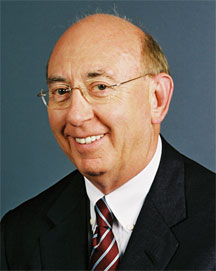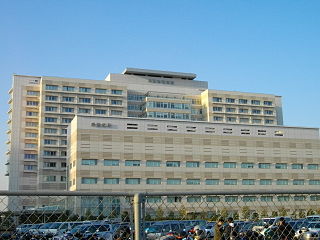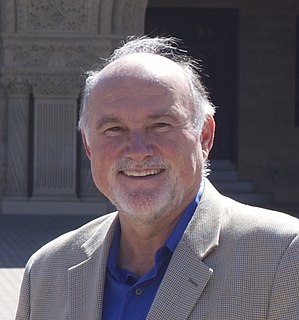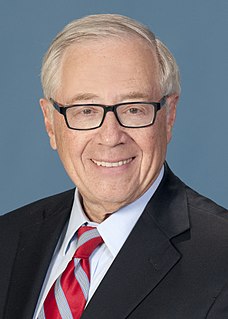
P-glycoprotein 1 also known as multidrug resistance protein 1 (MDR1) or ATP-binding cassette sub-family B member 1 (ABCB1) or cluster of differentiation 243 (CD243) is an important protein of the cell membrane that pumps many foreign substances out of cells. More formally, it is an ATP-dependent efflux pump with broad substrate specificity. It exists in animals, fungi, and bacteria, and it likely evolved as a defense mechanism against harmful substances.

Carcinoembryonic antigen (CEA) describes a set of highly related glycoproteins involved in cell adhesion. CEA is normally produced in gastrointestinal tissue during fetal development, but the production stops before birth. Consequently, CEA is usually present at very low levels in the blood of healthy adults. However, the serum levels are raised in some types of cancer, which means that it can be used as a tumor marker in clinical tests. Serum levels can also be elevated in heavy smokers.
Zbtb7, originally named Pokemon, is a gene that may act as a master switch for cancer, and is responsible for the proliferation of cancer throughout surrounding cells. The leader of the research team which discovered this, geneticist Pier Paolo Pandolfi from the Memorial Sloan-Kettering Cancer Center (MSKCC) in New York City, said the gene is unique in that it is needed for other oncogenes to cause cancer. Discovery of the gene was first published in the January 2005 issue of Nature.
Rakesh K. Jain is the Andrew Werk Cook Professor of Tumor Biology at Massachusetts General Hospital in the Harvard Medical School and Director of the E.L. Steele Laboratories for Tumor Biology at the Massachusetts General Hospital.

Josep Baselga i Torres, known in Spanish as José Baselga was a Spanish medical oncologist and researcher focused on the development of novel molecular targeted agents, with a special emphasis in breast cancer. Through his career he was associated with the Memorial Sloan Kettering Cancer Center, Vall d'Hebron Institute of Oncology, and the Massachusetts General Hospital in their hematology and oncology divisions. He led the development of the breast cancer treatment Herceptin, a monoclonal antibody, that targets the HER2 protein which is impacted in aggressive breast cancers.

Proto-oncogene tyrosine-protein kinase ROS is an enzyme that in humans is encoded by the ROS1 gene.

David B. Agus is an American physician and author who serves as a professor of medicine and engineering at the University of Southern California Keck School of Medicine and Viterbi School of Engineering and the Founding Director and CEO of USC’s Lawrence J. Ellison Institute for Transformative Medicine. He is also the cofounder of several personalized medicine companies and a contributor to CBS News on health topics.

John E. Niederhuber, MD was the 13th director of the National Cancer Institute (NCI), from 2006 until July, 2010, succeeding Andrew von Eschenbach, who went on to become a director at biotechnology firm BioTime. A nationally renowned surgeon and researcher, Dr. Niederhuber has dedicated his four-decade career to the treatment and study of cancer - as a professor, cancer center director, National Cancer Advisory Board chair, external advisor to the NCI, grant reviewer, and laboratory investigator supported by NCI and the National Institutes of Health. He is now Executive Vice President/CEO Inova Translational Medicine Institute and Inova Health System and Co-Director, Johns Hopkins Clinical Research Network.
Simon J. Hall, M.D., is the Associate Professor and Kyung Hyun Kim, M.D. Chair of Urology and Assistant Professor, Department of Gene and Cell Medicine at The Mount Sinai School of Medicine, as well as the Director of the Barbara and Maurice Deane Prostate Health and Research Center at The Mount Sinai Medical Center, both in New York City.
Molecular oncology is an interdisciplinary medical specialty at the interface of medicinal chemistry and oncology that refers to the investigation of the chemistry of cancer and tumors at the molecular scale. Also the development and application of molecularly targeted therapies.
Robert E. Wittes was Physician-in-Chief of Memorial Sloan-Kettering Cancer Center, from 2002 until December 31, 2012. Prior to his appointment at MSKCC, he was Deputy Director for Extramural Sciences and Director of the Division of Cancer Treatment and Diagnosis at the National Cancer Institute, where he oversaw NCI's extramural clinical and basic research programs, including the evaluation of new therapeutics, diagnostics, and translational research. Wittes is a fellow of the American College of Physicians, a member of the American Association for Cancer Research, the American Society of Clinical Oncology, and the American Federation for Medical Research. In addition to his institutional affiliations, Dr. Wittes has served as editor-in-chief of the Journal of the National Cancer Institute and Oncology. He has served on the editorial boards of Clinical Cancer Research, Current Opinion in Oncology, The American Journal of Clinical Oncology; Cancer Investigation, and The International Journal of Radiation Oncology-Biology & Physics, among others.
George Bosl is an American cancer researcher, holder of the Patrick M. Byrne Chair in Clinical Oncology at the Memorial Sloan-Kettering Cancer Center in New York City, and is a Professor of Medicine at the Weill Cornell Medical College. In 1997 he was appointed chair of the Department of Medicine at Sloan-Kettering.

Johannes Carolus (Hans) Clevers is Principal Investigator at the Hubrecht Institute for Developmental Biology and Stem Cell Research (KNAW) and the Princess Máxima Center for Pediatric Oncology, Professor at Utrecht University and Oncode Investigator. Clevers was the first to identify living stem cells in the intestine and is one of the world's leading researchers on adult stem cells, their role in cancer and their potential for regenerative therapy.

The Japanese Foundation for Cancer Research (公益財団法人がん研究会) (JFCR) is a non-profit cancer research organization based in Ariake, Tokyo. The JFCR was founded in 1908 as the first Japanese organization specializing in cancer by Katsusaburō Yamagiwa and his supporters. The Cancer Institute and its attached hospital of JFCR were set up in 1934. The JFCR became a full member of the Union for International Cancer Control in 1968.

Demetrios A. Spandidos is a Greek virologist and cancer researcher. He is an emeritus professor at the University of Crete where he was professor of virology from 1989 till 2015. He is also the founder of Spandidos Publications and the editor-in-chief of all eight of its journals.

Branimir Ivan Sikic is an American medical doctor and scientist at Stanford University School of Medicine. He is an oncologist and cancer pharmacologist, and has served as a faculty member at Stanford University since 1979. His research spans basic, translational, and clinical research and investigates the mechanisms of drug resistance and the development of new anticancer therapies.

Carl H. June is an American immunologist and oncologist. He is currently the Richard W. Vague Professor in Immunotherapy in the Department of Pathology and Laboratory Medicine at the Perelman School of Medicine of the University of Pennsylvania. He is most well known for his research into T cell therapies for the treatment of cancer. In 2020 he was elected to the American Philosophical Society.

Ronald S. Weinstein, M.D. is an American pathologist. He is a professor at the University of Arizona College of Medicine-Tucson. Weinstein served for 32 years as an academic pathology department chair, in Chicago, Illinois and then Tucson, Arizona, while also serving as a serial entrepreneur engaged in university technology transfer.
Magnus von Knebel Doeberitz is a molecular oncologist and virologist, a Professor of Molecular Oncology and Medical Director of the Department of Applied Tumor Biology at the Institute of Pathology at the University Hospital of Heidelberg. He also heads a Clinical Cooperation at the German Cancer Research Center.












